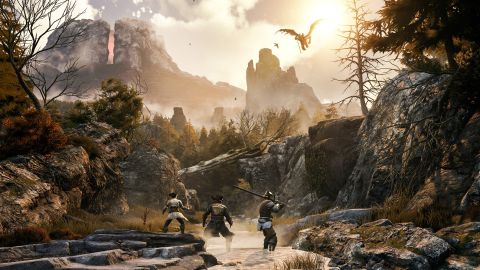Role-playing games (RPGs) are one of gaming's longest-running genres. Over the years, hundreds have been made, and different subgenres have formed as a result of developers trying to find a way to make their titles feel fresh. Some focus on an intricate combat system with nuanced mechanics; other RPG titles place a heavy emphasis on solving problems with charismatic speeches. Some even make movement a key factor, allowing you to leap across rooftops. The list goes on, and while some games blend some of these elements together, very few have attempted to merge them all.
GreedFall, a new game from developer Spider, is the latest to try and combine the many different types of RPG design into one cohesive experience. And while it falters in some ways, the title is, overall, one that most players will have a great time playing.

$50Bottom line: GreedFall delivers an experience that is as satisfying as it is ambitious, although it does falter in some notable ways.
For
- Fantastic premise and story
- Excellent gameplay depth
- Combat system is extensive
- Gorgeous artistic direction
- Loads of replayability
Against
- Poorly-done dialogue system
- Animations could be much better
- Performance is a bit lacking
Explore a new frontier

GreedFall's premise is a simple one: you, as a high-ranking official of The Congregation of Merchants, set sail for a recently discovered island called Teer Fradee. Your goal is primarily to search for a cure to a deadly plague known as the Malichor, but ultimately, you are free to create your own story, forming alliances with other factions, helping others with problems, or simply exploring the island and seeing what it has in store.
GreedFall's narrative themes are executed very well, resulting in a story that was thoroughly enjoyable.
Though the game is designed to be open-ended, GreedFall has quite a bit of narrative depth should you wish to delve into it. For example, interactions between the natives of the island and the factions that have come to settle it pose thought-provoking questions about welcoming newcomers. Is it worth it for the chance of forming alliances and establishing valuable trade? Or is the risk of a colonialist takeover too great? The game never directly takes a stance on this topic, and instead leaves it up to you to form your own opinions and influence the world accordingly — and this is just one of the several types of themes you'll encounter in GreedFall.
Aside from the game's main ideas, there is also a sizable cast of different companions that you can take with you on your adventures. Each of these characters is varied and interesting, and they will often be able to offer different perspectives to you that may help you make choices during the game. For example, Vasco has a nose for situations that seem shady; Aphra, on the other hand, loves science, and she doesn't hesitate to inform the player when she thinks a specific choice may benefit the pursuit of knowledge. Overall, GreedFall's companions are great.
Play your way
GreedFall's gameplay is comprised of both combat and other forms of problem-solving. Both are extensive, although the "problem solving" gameplay is what impressed me the most with GreedFall. This is where the game merges several different RPG design tropes into one system — for almost every major quest in the game. There are a plethora of different ways you can complete your objective. For example, one early mission tasks you with sneaking into a guarded structure. You can get inside by convincing the exterior guards that they are missing an important roll call, crafting sleeping drugs and knocking the guards out with spiked wine, picking locks, stealthily making your way in at a back entrance, or even climbing up on top of cargo crates and coming through a window à la Assassin's Creed. The sheer amount of options you have for situations like this throughout the game is crazy, and the fact that some of them will be unavailable to you based on how you spec your character adds significantly to GreedFall's replay value.
GreedFall's quests are incredibly open-ended, and there is no shortage of different ways to complete them.
If all else fails, there's always combat, too. GreedFall's combat mechanics are simple, but require practice to master. In brief, you'll be taking melee weapons, firearms, or magic into battle, and enemy attacks can be defended with either a well-timed dodge or a parry. Character attributes further determine specifics such as how much armor you can wear or how strong your magic can be, and like with the rest of the gameplay, the fact that you can't be a "master of everything" ensures that you'll always be able to approach combat in a new way with each new playthrough of the game you do. Enemies are varied and challenging, and each type of foe will attack you in different ways. Throughout GreedFall, you'll find dozens of new opponents that do this, with the most dangerous of them all being gargantuan monsters that function as bosses. These are just the basics; there are status effects, special attacks, and other things that give combat even more layers of depth.
The only area where I feel that GreedFall falls very short is with the dialogue system. While the voice acting for the characters themselves is great, most conversations have a significant lack of speech options to choose from, and this makes being a charismatic character feel disappointing. Where a game like Mass Effect gives you four-to-six dialogue choices, GreedFall typically only gives you two, maybe three if you're lucky. It's a real bummer, because this is the only type of gameplay mechanic that I think GreedFall doesn't do well, and it also happens to be a pretty major one as far as RPGs are concerned.
Take in the sights

In terms of presentation, GreedFall is mostly good. The graphics aren't incredible by any means, but they're solid, and the foliage, in particular, looks great. The island of Teer Fradee is brought to life with a rich, vibrant color palette of leafy greens, golden yellows, and autumn oranges, along with the stony grays and tans that constitute the various towns and cities being built by factions. The music is pretty awesome, too, but one area where the game definitely falls short is with its animations.
GreedFall's animations are stiff, with the lip-sync facial animations standing out as terrible.
Instead of feeling fluid, animations in GreedFall often look very stiff. The best way that I can describe it is that instead of motion feeling like a flow, body parts just "teleport" to where they're going. Sure, it's functional, and not all of them are like this, but it still irked me nonetheless. The facial animations are a different can of worms, though, as the lip-syncing during dialogue scenes is absolutely horrendous to the point of being very distracting. Considering the dialogue system is already poor, this just makes things even worse.
Performance-wise, GreedFall runs okay, although it could be optimized better. I was maintaining a decently smooth frame rate more often than not, but things can slow down noticeably in areas with plenty of enemies or NPCs. On occasion, the game can start to stutter as well, although I wasn't able to determine why.
Should you buy GreedFall?

Despite the lacking dialogue system and the issues with the game's presentation and performance, I still think any fan of RPGs should check out GreedFall. It's an impressive title that manages to mostly achieve its goal of being a blend of several RPG design styles, and the result is an experience most players will enjoy quite a bit.
If good speech mechanics are something you care a lot about, then I would advise waiting for a sale for GreedFall, as you will likely be disappointed if you buy at full price. Aside from that, though, I fully recommend giving this ambitious RPG a chance.
GreedFall will be available on September 10, 2019 for $50 on Xbox One and PC.

Tell your own story
GreedFall delivers an experience that is as satisfying as it is ambitious, although it does falter in some notable ways.
Brendan Lowry is a Windows Central writer and Oakland University graduate with a burning passion for video games, of which he's been an avid fan since childhood. You'll find him doing reviews, editorials, and general coverage on everything Xbox and PC. Follow him on Twitter.

